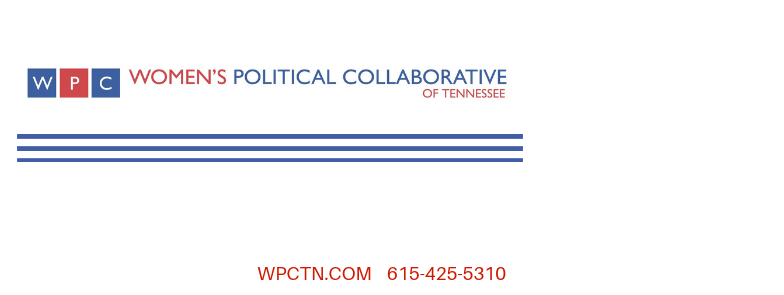Legislative Report February 10, 2012
NWPC Legislative Report
February 10, 2012
By Deborah Lively and Anne Carr
The 2012 legislative session, convened on January 10, is just now beginning to pick up steam. Governor Haslam presented his budget address on Monday, Jan. 30, and the bill filing deadline for both the House and the Senate has now passed. For the fiscal year beginning on July 1, 2012, the Governor has proposed full funding of $15 million in recurring dollars for the Coordinated School Health (CSH) program, as well as recurring funding for several items that had been considered for cuts, including breast and cervical cancer screening, HIV testing, and safety net funding for primary care clinics.
WPC follows many issues of general interest to our members, including voter ID, domestic violence and domestic relations, sex trafficking, and women’s reproductive health. Here is a description of some of the 40 plus pieces of legislation of interest and filed this year. (Although much legislation from last year remains pending, we expect little, if any, action on the bills filed in 2011.)
Voter ID
At least 20 bills have been filed on the driver’s license picture ID to vote requirement, which was approved last year. Some of them offer additional forms of picture ID that would qualify, such as student ID (SB2379/HB2242) or any government employer ID (SB2378/HB2241 and SB3708/HB2178). Others aim at perceived problems for certain voters, such as the elderly, who are less likely to have a picture driver’s license or a license at all (SB2366/HB2190).
SB2590/HB2823, by Rep. Jim Coley and Sen. Beverly Marrero, is a continuation of their efforts to ensure that Tennessee law is in line with national recommendations aimed at stopping sex trafficking. This bill provides for immunity from prosecution for prostitution when a person has been a victim or involuntary labor or sex servitude or is a victim as defined under the federal Trafficking Victims Protection Act.
Domestic Violence
A number of bills address domestic violence and sexual assault. SB3145/HB3578, by Sen. Charlotte Burks and Rep. Sherry Jones and originated by the Tennessee Coalition Against Domestic and Sexual Violence, creates a process for collecting information when a victim seeks medical treatment but objects to revealing his or her identity. TCADSV believes this bill will encourage victims of domestic violence or sexual assault to seek
confidential medical treatment, while also allowing law enforcement and policy-makers to track these crimes.
Reproductive Health
SB3182/HB2563, by Sen. Mike Bell and Rep. Cameron Sexton, is an interesting bill. It modifies the “Family Planning Act of 1971,” that sets out state policy on access to birth control, which is essentially that people who need birth control supplies and information should have access to it.
In Section 68-34-103(4) of the current language, the bill deletes the highlighted language indicated: (4) Section 68-34-104 sets forth the policy and authority of this state, its political subdivisions, and all agencies and institutions thereof, including prohibitions against restrictions, with respect to contraceptive procedures, supplies and information.
In Section 68-34-104(1), the highlighted phrase is eliminated and the word “Appropriate” is used to replace it: (1) All medically acceptable contraceptive procedures, supplies, and information shall be readily and practicably available to each and every person desirous of the same regardless of sex, race, age, income, number of children, marital status, citizenship or motive. (The word “appropriate” is not defined in
the legislation.)
In addition, two resolutions apparently aimed at restricting the use of “Plan B” emergency contraception have been introduced. They are HJR 527, which urges TennCare to seek a federal waiver so that it is not required to provide emergency contraception, and HJR 554, which urges both the Dept. of Health and TennCare not to
provide emergency contraception. Rep. Sexton is the sponsor of both resolutions.
Drug Screening for TANF
We don’t always follow TANF (Tennessee Aid for Needy Families – federal welfare payments) issues, but the drug screening discussion seems like one that warrants a look. Since the payments are to destitute single parents with minor children, adding the cost of a mandatory drug test may not make sense. This is SB2580/HB2725, by Sen. Stacey Campfield and Rep. Julia Hurley.

